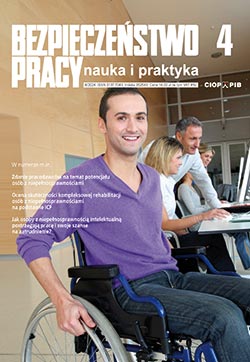Sound of school bell – information signal and source of noise. Original research
Izabela Jakubowska
This article presents the results of research on the sound of a school bell as source of information and, at the same time, as a source of noise. Both the corridor and classrooms in a primary school were considered. There were two criteria: lack of harmfulness (i.e., no harmful effect on human hearing) and audibility in the corridor at the beginning of the lesson and in classrooms at the beginning of the break. The results showed that the sound of the school bell did not exceed the acceptable level of noise in the work environment (considering protection of hearing) and was audible both in the corridor and in classrooms. The article also discusses the result of an experiment with changing the location of school bells to achieve lower exposure to noise without loss of audibility.
Age, tenure and general health as factors influencing occupational risk perception
Szymon Ordysiński
Behaviours and attitudes of workers in hazardous situation significantly depend on subjective perception of risk in the working environment. In the literature, it is widely recognized that subjective perception of risk is related to work change, not only under the influence of external factors, but also personal ones such as age, tenure or the worker's general health. This article presents the results of a survey, conducted among 1021 manual workers, on the relationship between the abovementioned factors and risk perception as well as opinions on the ability to work at over 60 years old.
Contract of mandate and contract of employment
Karolina Aromińska
Employers deciding to enter into civil-law agreements because of their obvious benefits must be aware that employment under a contract of mandate also entails negative consequences for the mandator. These mainly consist in the risk of recognizing an employment relationship because of an incorrect or imprecise wording of the mandate contract or an incorrect way it is carried out. If an employer does not provide much freedom and autonomy in the organization of mandatory work and thus affects the performance of the contract in a way that the alleged mandatory performs it being the employer's subordinate, defines work hours (strictly determines the beginning and end of work time), indicating the exact place of work, in particular in the employer's headquarters, the employee demanding recognition of an employment relationship will certainly win in labour court. If the legal relationship has most of the above elements, then it is crucial to determine which of these characteristics predominate. However, if the contract has features common for both an employment contract and a civil-law contract with the same intensity, the deciding factor is the consistent intention of the parties and the purpose of the contract. Interestingly, what the agreement is called is not crucial in this case.
European initiatives for road traffic safety improvement
Krzysztof Goniewicz, Mariusz Goniewicz
Road accidents are one of the most important problems of health and social policy of the modern world. The problem of road accidents appeared early in the development of the automotive industry and, together with its development took epidemic proportions. Currently, in the world, a fatal traffic accident occurs on average every 50 seconds, and every 2 seconds it causes injuries to humans. According to WHO data, over 1.3 million people die each year on roads, and between 20 and 50 million suffer serious injuries and mostly require lengthy and costly treatment. Many consequences of road accidents can be effectively prevented. This requires continuous work on new methods and techniques for effective and sustainable prevention. In recent years, due to the continuous increase in the number of deaths and injuries on the road, there have been many initiatives to improve road safety in the continental and global scale. This paper presents the most important global and European programmes for preventing road accidents.




























